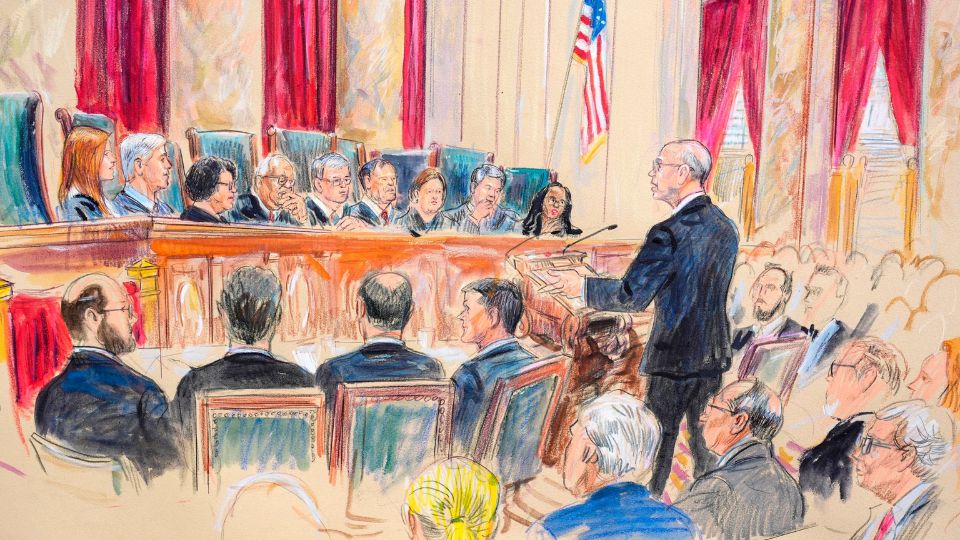When Donald Trump said he couldn’t be prosecuted for trying to overturn the 2020 election because he was the president, legal experts ABC News talked to thought it wasn’t a strong argument.
Last week, during a discussion that lasted almost three hours, some Supreme Court justices appeared to be considering the idea of providing certain restrictions on holding former presidents accountable for any crimes they may have committed while in office. According to experienced court observers, the turn of events was surprising.
“Some of the justices expressed the idea that a president could potentially engage in criminal misconduct without facing legal consequences, which was surprising,” said Michael Gerhardt, a constitutional expert at the University of North Carolina, in an interview with ABC News. “I believe that this idea has been seen as impossible by many people, until now.”
“I believe that most of the American public will find this part very hard to believe,” said David Schultz, a professor at the University of Minnesota and an expert in constitutional law. “The concept of suggesting that the president of the United States is exempt from the law in comparison to the general population.”
The justices appeared ready to reject Trump’s broad claim of “absolute” immunity, but they will need to determine which official acts can be exempt from criminal prosecution. This decision will establish a new standard for presidential power.
“This is a completely new situation for the court that we have never encountered before,” Schultz said, “and it will establish significant new legal principles in the United States.”
The judges struggled with the unique nature of the case during Thursday’s hearing. Justice Neil Gorsuch said that their decision will have a long-lasting impact. Trump is the first president to face criminal charges, but the arguments didn’t focus much on him or the specific allegations against him.
Also Read: Maine GOP Platform Aims at Transgender Education, Abortion, Unions and Voting Access
The question of immunity was brought before the Supreme Court in a case filed by special counsel Jack Smith. The case alleges election interference. Trump is facing four felony counts, which include conspiracy to defraud the United States, conspiracy to obstruct an official proceeding, obstruction of and attempt to obstruct an official proceeding, and conspiracy against rights. He said he did not do anything wrong and denies all accusations.
“In a way, Trump did not appear to be significant in this situation,” Schultz said, expressing confusion. The debate mainly discussed hypothetical situations, with the justices expressing worry about the potential outcomes of providing either too much or too little protection for future presidents.
“The question that arose was, ‘What does official conduct include?’ “And that’s where, I think, the disagreements among the justices were revealing,” said Gerhardt. During the discussion, Justice Elena Kagan asked Trump attorney John Sauer if a president has the power to order the military to carry out a coup and be protected from any consequences. In their opinion, Sauer said a president could.
“The response she received was one of the most unsettling I have ever heard at the Supreme Court,” Gerhardt said. Justice Sonia Sotomayor also asked Sauer if a president could order the military or someone else to kill a political rival. Sauer responded that this could be seen as an official act, depending on the specific situation.
“If we remove the possibility of being held legally responsible for their actions, wouldn’t there be a high chance that future presidents would feel more confident in committing crimes without any consequences while they are in office?” Justice Ketanji Brown Jackson inquired.
However, some conservative justices seemed mostly worried about the possibility of future unfair prosecutions of former presidents. They were concerned that this could make it difficult for presidents to make difficult decisions as part of their job.
Trump’s lawyer also argued this point during his opening statement, saying that the possibility of being prosecuted would affect the president’s decision-making at a time when bold and fearless action is necessary.
Justice Samuel Alito suggested that if presidents didn’t have immunity, they might be motivated to commit crimes to remain in power instead of retiring peacefully. This is because they might worry about being prosecuted by a “bitter political opponent” after leaving office. “Won’t that cause a cycle that disrupts how our country operates as a democracy?” Alito asked.



Leave a Reply